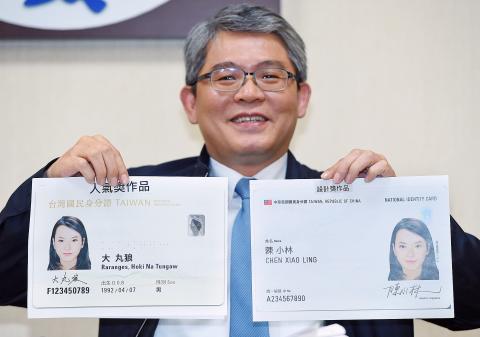A panel comprised of designers and representatives of the Ministry of the Interior and the Ministry of Culture yesterday awarded designer Vance Luic’s (魯少綸) “Shape” (形) the design award for what is to serve as the blueprint for a new national identification card.
The Ministry of the Interior on Feb. 26 launched an online design competition for the card, which is to have an embedded chip.
“Shape” uses mountain and ocean imagery as the background, a choice that indicates a higher level of tolerance and acceptance than the usual choice to symbolize land: the shape of Taiwan, the Ministry of the Interior said.

Photo: Liao Chen-huei, Taipei Times
The textual design is clean and concise, and is able to accommodate names of varying lengths and other information, as well as a clear rendition of a person’s English-language name, it said.
It was the most neutral design, with no obvious preference for gender or primary culturing, making it an ideal candidate for a national identification card, it added.
Rika Su’s (蘇意茹) “Ethnicity; Sea and Mountain; International” won the creativity award, while designer Lin Hao-han’s (林昊翰) “Taiwanese National Identity Card — Local Residents of the Island” received the most popular award.
The most popular design is not necessarily the best design, designer Aaron Nieh (聶永真) said yesterday, addressing an Internet backlash over Luic’s design, which received 46 votes, being chosen over Lin’s design, which garnered 97,498 votes.
The panel’s duty was to ensure that all designs were given an equal chance, in spite of the online votes, which could have easily favored earlier designs over later ones, he said.
While it is understandable that people would be disgruntled that their pick was not chosen by the panel, such feelings should not lead to unjustified criticism of another design, he added.
Netizens who favored Lin’s design had commented that the selection process was a “sham” and that the decision was “handpicked.”
Lin’s design was only a few votes short of winning, Nieh said.
The use of Taipei 101 for the anti-forgery image, which is revealed when exposed to ultraviolet light, was the main shortcoming, as many other images and symbols could represent Taiwan other than the obviously dominant skyscraper or other stereotypical tourist attractions, he said.
Nieh expressed sadness over the winner being verbally bullied for their efforts, saying: “If the creators feel nothing but depression and fear, we too have nothing.”
“Populism is a very scary thing, and we should endeavor to not let ourselves become an oppressor,” he said.
Deputy Minister of the Interior Hua Ching-chun (花敬群) told a news conference that the selection process did not focus on any particular symbol or national recognition, adding that it is normal to have the nation’s flag on the national identification card.
“Shape” has a professional design, is practical and expresses the essence of Taiwan in a more reserved sense, he said.
The Ministry of the Interior would use the design as a reference point for the design of the new national identification card and would consult its designer on a regular basis, he added.
The new card project is estimated to cost up to NT$4 billion (US$134 million).

The inspection equipment and data transmission system for new robotic dogs that Taipei is planning to use for sidewalk patrols were developed by a Taiwanese company, the city’s New Construction Office said today, dismissing concerns that the China-made robots could pose a security risk. The city is bringing in smart robotic dogs to help with sidewalk inspections, Taipei Deputy Mayor Lee Ssu-chuan (李四川) said on Facebook. Equipped with a panoramic surveillance system, the robots would be able to automatically flag problems and easily navigate narrow sidewalks, making inspections faster and more accurate, Lee said. By collecting more accurate data, they would help Taipei

TAKING STOCK: The USMC is rebuilding a once-abandoned airfield in Palau to support large-scale ground operations as China’s missile range grows, Naval News reported The US Marine Corps (USMC) is considering new sites for stockpiling equipment in the West Pacific to harden military supply chains and enhance mobility across the Indo-Pacific region, US-based Naval News reported on Saturday. The proposed sites in Palau — one of Taiwan’s diplomatic allies — and Australia would enable a “rapid standup of stored equipment within a year” of the program’s approval, the report said, citing documents published by the USMC last month. In Palau, the service is rebuilding a formerly abandoned World War II-era airfield and establishing ancillary structures to support large-scale ground operations “as China’s missile range and magazine

STATS: Taiwan’s average life expectancy of 80.77 years was lower than that of Japan, Singapore and South Korea, but higher than in China, Malaysia and Indonesia Taiwan’s average life expectancy last year increased to 80.77 years, but was still not back to its pre-COVID-19 pandemic peak of 81.32 years in 2020, the Ministry of the Interior said yesterday. The average life expectancy last year increased the 0.54 years from 2023, the ministry said in a statement. For men and women, the average life expectancy last year was 77.42 years and 84.30 years respectively, up 0.48 years and 0.56 years from the previous year. Taiwan’s average life expectancy peaked at 81.32 years in 2020, as the nation was relatively unaffected by the pandemic that year. The metric

A 72-year-old man in Kaohsiung was sentenced to 40 days in jail after he was found having sex with a 67-year-old woman under a slide in a public park on Sunday afternoon. At 3pm on Sunday, a mother surnamed Liang (梁) was with her child at a neighborhood park when they found the man, surnamed Tsai (蔡), and woman, surnamed Huang (黃), underneath the slide. Liang took her child away from the scene, took photographs of the two and called the police, who arrived and arrested the couple. During questioning, Tsai told police that he had met Huang that day and offered to